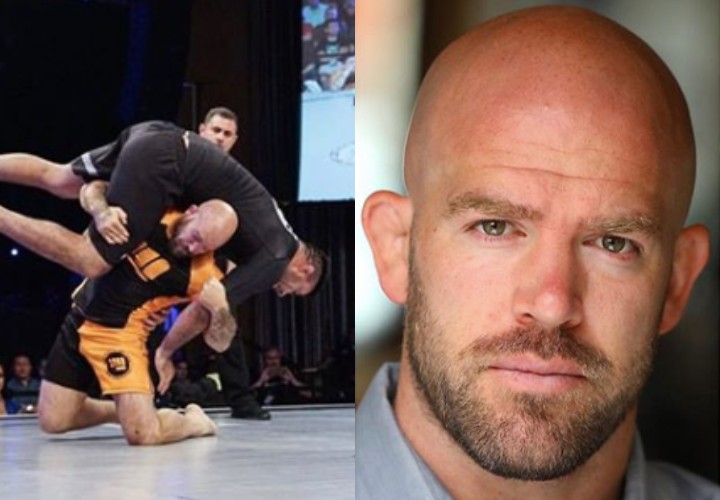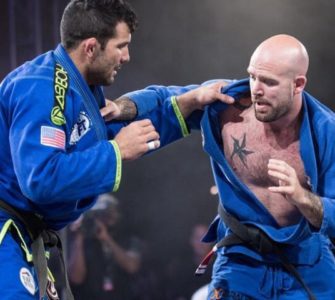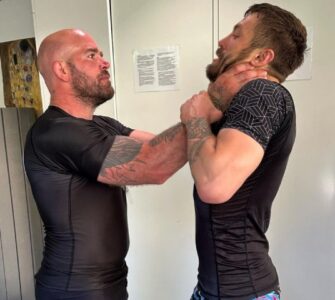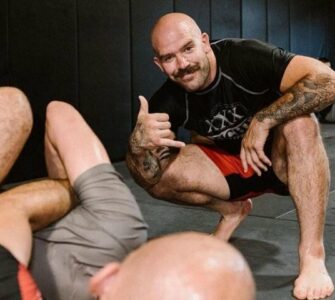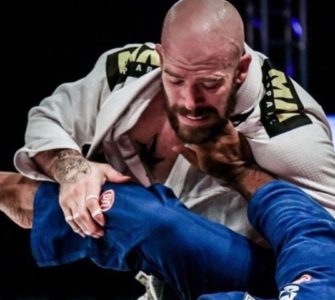Kit Dale is one of the most beloved and recognizable jiujiteiros of today. It is through his entertaining personality, combined with a deep knowledge and understanding of the Brazilian Jiu Jitsu game – displayed primarily through his concept-oriented coaching, which is available for anyone through his instructionals as well – that Kit has left quite a legacy for the general BJJ community.
Recently, we had a chance to talk with him and hear about his current plans, his unusually quick rise to the black belt level (in less than 5 years), his preference for concepts over techniques in BJJ and many other things.
BJJEE: Kit, thank you for being a part of this interview! It is our pleasure.
You are a very active and all-around person, liked by many: you are not only a top BJJ competitor and coach, but you are also an actor, an Instagram “comedian” and much else!
Could you tell us a bit more on what you are up to currently? What are your current plans and aspirations, both in terms of jiu jitsu and other things that you pursue?
Kit: Thank you for your kind words. Right now I’m at a bit of a rebuilding stage of my life.
I’ve been competing and coaching BJJ for 11 years now, and with the exceptions of 2 or 3 of those years being injured, I’ve had a great run.
However, at the moment I’m spending 80% of my focus on acting in film. And 20% is spent on BJJ. I feel very happy with my level of jiu jitsu and with what I have accomplished, so I currently don’t feel the need to do anything further about it.
Sure, I will still continue to coach and compete, but I will do it only as a hobby that I do for myself – not by trying to do it as a professional, like most others do. You see, I’m 33 years old now, and I need to be looking towards the future for something more challenging and forgiving on the body. So, acting has become the main focus of mine, because it allows the same creativity that I enjoy in BJJ… And it’s something that I can aggressively pursue into my later years.
BJJEE: We understand, and we are crossing our fingers that you will achieve everything that you’re set out to do!
Now, going back to your BJJ beginnings: you’ve started jiu jitsu fairly late in life, when you were 22 years old. Prior to that, however, you’ve been training Australian football with quite some dedication.
What has been the reason for that young man to change his direction and opt for BJJ instead of football?
Kit: I got to a point in Aussie Rules Football where I had achieved all that I wanted to. I won three premierships, 2 best and fairest’s, I played inter league, and I’ve made the Victorian country squad. After all of that, I wanted a new challenge. So I decided to quit football in order to pursue BJJ.
However, I was originally introduced to BJJ because I wanted to become more confident with myself physically. I was always a very shy and insecure kid, especially when it came to physical confrontations. So I wanted to learn how to protect myself, but I fell in love with jiu jitsu because of the problem solving part of it.
I always describe to people that BJJ is like trying to solve a mathematical equation that is self aware and trying to solve you at the same time.
BJJEE: So, it has been that cognitive aspect of problem-solving that made you fall in love with BJJ. And was there anything else to it, which made jiu jitsu even more attractive to you?
Kit: Well, it was mostly the fact that I could compete in a fun, challenging and rewarding sport that came with little consequences. It’s one of the rare arts or sports that you can compete at a 100% effort and still walk away unscatched most of the time. The problem solving part, however, is what kept me in the sport.

BJJEE: Agreed. So, all of that love towards solving the constantly changing environment of BJJ has given back a lot of success for you; you are actually one of the few athletes that have gotten their black belts in 5 years or less. That is an even bigger feat, considering – as said prior – that you’ve started training at 22 years of age!
What do you think has been the primary culprit to such fast progress? You’ve always pinpointed the importance of “mental” aspects of training over the physical ones; does that have anything to do with it?
Kit: I think that one of the best things I did in jiu jitsu was not listening to coaches (laughs).
I always wanted to work the problems out myself. I found a lot of pleasure in solving the puzzles that BJJ offers. And it almost felt as if it was cheating to get told what to do.
I also realised that learning should be an organic and personal journey. Most people look at learning as a mechanical thing, where they get told what to do, then repeat that and then they think that they’re proficient. Well it doesn’t work that way. The best teacher is always – experience. And the best method is trial and error.
So, instead of learning techniques and drilling them until they became muscle memory – which would make me rigid and predictable, and my jiu jitsu journey boring – I used specific training to advance… Meaning, I was training in specific areas while having key goals in sight. And I allowed myself to learn through trial and error.
You know, BJJ is a lot more simple than people tend to think it is. Essentially, It’s basic body mechanics. You don’t need to be told what to do, you can figure it out. And that’s what I became good at. At problem solving. I feel it’s far more effective to be a great problem solver than a person with hundreds of techniques; it’s the difference between knowing jiu jitsu and knowing jiu jitsu moves.
BJJEE: That makes a lot of sense, thank you for sharing it with us! Following that line of thought, you are a big advocate for learning about and practicing BJJ concepts, which is something that you are successfully teaching people through your instructionals available on your website.
How did you develop this interest in and understanding of concepts? Why do you think concepts are so important, even more so than techniques in some cases?
Kit: Because they are far more powerful, and because they suit every body type.
I can teach you a technique that I do, but there is a huge chance that it won’t work as well for you as it does for me. This is because we are built differently, and because a specific technique can only go as far as being used in a specific position… But, if I teach you a good concept, then it is more universal to utilize and it allows far more flexibility in its application, making it valuable to anyone through that.
There’s an old saying: “Catch a man a fish, feed him for a day. Teach a man to fish, feed him for life”, and it explains to me the power of concepts over techniques. I elaborate a lot more on that in my products.
BJJEE: Also, along those lines, you’ve said that you don’t favor drilling and that, in some ways, the drilling part of training is a waste of time.
Why do you believe that is true? And is there a way to make our drilling more efficient?
Kit: I think that there are far more efficient ways of training than drilling, yes, by a ratio of 5-1, disadvantageous to drilling… But, if drilling is what you enjoy, then I think that the best way to do it is by rotating your training partners, so you can get used to doing it on different body types. And do it randomly, not in bulk, so that you still work on your problem solving ability and not just your body.
This sort of an approach will make you think quickly when selecting a technique to execute, rather than blindly repeating the same one over and over again.
BJJEE: Similarly, if you could teach a student to implement only one concept in training and/or competition, which concept would that be?
Kit: It would be the concept that there is no right or wrong technique, but just a right and wrong time to execute it.
Every technique can be countered. So, the timing is the key factor. You can have the most perfect technique, but if you keep telegraphing it, you will rarely be successful with it. On another side, you can have a sloppy technique, but if it’s executed at the right time it will be successful.
So, focus on the timing. But, in order to know the timing, you must know “why” you’re doing something. If you keep asking “why” to everything in jiu jitsu, you will eventually have a deep intellectual understanding of it. It’s called the Socratic method, by Socrates. So, the best concept that I can offer is to get people to ask “why” in everything.
BJJEE: Thank you for sharing those golden nuggets of wisdom with us, Kit. Now, turning away from the focus on concepts, we would like to hear about your experiences in BJJ.
Do you have specific lessons from the mats that have taught you the most? Could you tell us a little about them?
Kit: I think that the most important lesson I have learned is that perseverance pays off.
This was not exactly learned through my own experience, but rather from others. I think that, with the speed in which I picked up jiu jitsu, it made me think that jiu jitsu wasn’t so hard. But I had friends who did not learn jiu jitsu as fast as I – but they just kept persevering everyday and now they are some of the top grapplers in the world.
This gave me confidence in areas outside of jiu jitsu where I felt I was not learning very well. I stuck with them and I have now become proficient in them… For example, one of them is articulating myself verbally: I’ve spent years on trying to improve, and if it were not from seeing my friends push through their hard times to become successful, I would perhaps have given up.
BJJEE: So, the lesson in perseverance is the most important one. But, on the other side of the same coin: do you have an extraordinarily happy memory from the mats that you’d be willing to share with us? Maybe some sort of a friendship that you’ve developed, a funny situation or something else?
Kit: All of my happiest moments are found in the friendships that I’ve made. I don’t care so much about the medals or wins anymore, but I do care about the connections and friendships I’ve made along the way. And I’m very lucky to have made a lot of them.
This is why I’ve always leaned towards the Abu Dhabi Pro instead of Mundials; because you get to train and mingle with everyone, rather than just turning up to the event, competing it and then leaving.
BJJEE: So, it’s about the people we meet along the way, as it is with most things in life.
To finish off, we’d like to know whether there is some sort of a “secret recipe” or a piece of “secret advice” that you don’t share often, but could share with our readers?
Kit: Sure. I don’t share this because it can sound negative… But if you’re pursuing jiu jitsu professionally for any other reason apart from loving it, then stop and find something else.
Jiu jitsu is amazing and it does come with many rewards, but it also comes with consequences that I’ve experienced and that people neglect to mention: the injuries, the pain, etc. These take their toll after a while, especially if you’re egotistical in your training and competition.
Jiu jitsu doesn’t pay much as well. And it is still rather small, so if it’s for money or fame that you’re doing it, then go play golf (laughs). Do jiu jitsu professionally only if you love the journey! Because the destination is often unfulfilling. 🙂
BJJEE: Thank you, Kit, for contributing. Prior to us concluding the interview, is there something additional that you’d like to share with our readers?
Kit: If you’d like to see more from me and how I trained to excel quickly, as well as to learn about my concepts, please check out my website: www.kitdaletraining.com.

